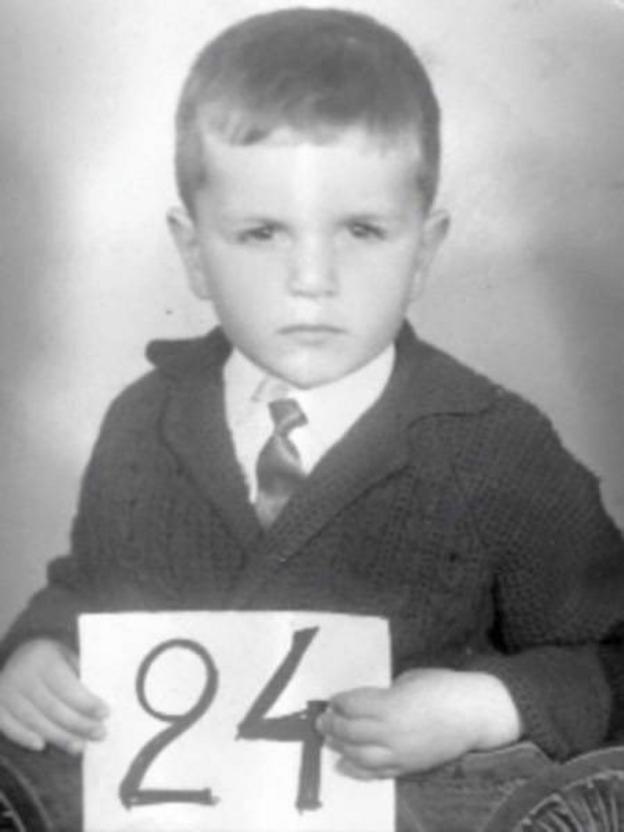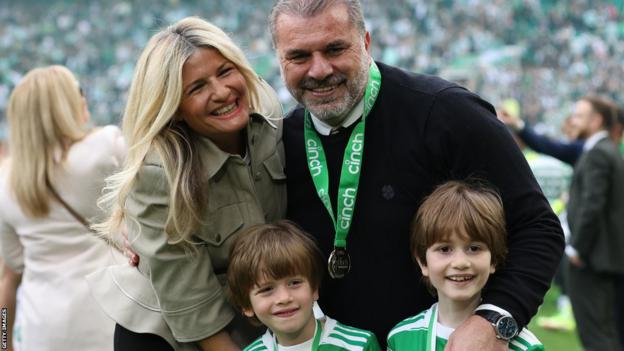Ange Postecoglou: The boy from Greece who has become Tottenham's main man

Last updated on .From the section Tottenham


It could be argued that the most arresting picture of Ange Postecoglou is not anything taken at the side of a football field with Celtic, not a shot of him celebrating any of the trophies he won in Scotland.
Nothing, really, from his successful days at Yokohama Marinos or Brisbane Roar or the Socceroos or South Melbourne Hellas can hold a candle to the photograph taken of him as a five-year-old holding a card with the number 24 on it.
That was his immigration number when his parents took him out of the military junta regime of Athens, Greece to a safer but uncertain haven of Melbourne in Australia. That's where it all started. That's why the photograph has a poignancy.
The little boy is looking down the camera lens with the same kind of stare that many years later, as Australia coach, would regularly burn a hole in the back of the head of his players in training, said former Socceroo Tim Cahill.
His friend, Paul Trimboli, said Postecoglou doesn't say a lot, he doesn't make things comfortable for people, and for a lot of folk "that can be unnerving".
Even at five, you can see some of that in the picture. A steely look.
This was Angelos Postecoglou. Five years later his parents legally changed his name to Angelos Postekos, but he never cared for Postekos.
"It was a fad in those days to shorten your name if you were Greek," he said years ago. "I never liked it and I never used it. I was proud of my background, but when it came to my first passport and my first driver's licence, there was nothing I could do about it."

On Saturday, Postecoglou won his fifth domestic trophy from a possible six since his move to Scotland from Japan in the summer of 2021. On Tuesday, he was officially unveiled as the new head coach of Tottenham Hotspur.
A Celtic manager winning lots of titles is nothing new, but there is something different about this.
Postecoglou didn't inherit a champion team in need of minor tweaks as, say, Brendan Rodgers had done before him. The season before Postecoglou took over, the club lost their bid for 10 league titles in a row by a whopping 25 points and the mood music at Celtic was dismal.
Rangers had knocked them out of the Scottish Cup, Ross County had eliminated them from the League Cup, there were furious protests and banners calling for heads to roll. The atmosphere was toxic. Legions of fans spoke of their disillusionment. They felt they were being taken for granted and ignored.
Manager Neil Lennon was sacked. Peter Lawwell, the long-standing chief executive, signalled his intention to resign. He was replaced by Dominic McKay, who lasted two months and then left for reasons unexplained.
For the longest time, the club wooed Eddie Howe. They waited and waited for him to agree to become their next manager but months down the track, he said no. Cue more supporter thunder.
More than 100 days had passed and still Celtic had no manager. The fans were in thermonuclear mode. A total overhaul of a tired squad was required - and quickly. Celtic needed a brand new team.
Enter Postecoglou with his calm focus and his unerring eye for a player. And very quickly, things started to make sense.

More and more people were looking at what he'd done before Tottenham came calling - the excellent signings, the attacking style, the relentless nature of his team and his coolness in the maelstrom of Glasgow football - but the really interesting stuff, the soul of the guy, can be found in his back story.
He could win any number of trebles with Celtic but nothing will match the tale of how he got to the club in the first place.
"I just can't believe what my parents went through," he once said. "What they would have gone through to take a young family halfway round the world, on a ship that takes us 30 days, to a country where they don't speak the language, they don't know a soul, they don't have a house, they don't have jobs.
"People say they go to another country for a better life. My parents did not have a better life, they went to Australia to provide opportunities for me to have a better life."
His sister, Liz, is five years older and recalls the early months in Melbourne.
"They arrived here with just suitcases, having to care for two little children," she recalled in the documentary Age of Ange. "It was difficult for her [Voula, her mother]. I remember many nights hearing her crying."
Postecoglou's father - Dimitris, known as Jim - was a hard worker. Up early, home late, no nonsense. Football was his escape and his salvation.
On Sundays, he took his son to South Melbourne Hellas, a club set up for Greek immigrants. There was church in the morning and football in the afternoon. That was the rhythm of life.
"As a kid, I just wanted to fit in. I didn't necessarily like the fact I came from another country and had a really long surname that nobody could get their mouth around. For a young boy the best way to fit in was sport," Postecoglou recalled.
Football wasn't just a game to play, it was his one opportunity to bond with his father, his hero, as he's described him.
In that documentary he's seen thumbing through his old comics and books. "It's why I keep them. It reminds me what my childhood was like. There was a lot of living in a fantasy football world that didn't exist here in Australia."

There's footage from his football days where he's called Angelos, Angie and then Ange.
He retired at 27 through injury. He won the Australian national championship (the great Ferenc Puskas was his manager) but always knew in his bones that coaching was where his future lay.
There was a dread, though. And it goes back to his father again. What if he didn't make it as a coach? What if he failed? That was his conduit to his father. "What would that mean to dad and I? How would we fill the void?"
He needn't have stressed. He won two national championships as manager of South Melbourne when everybody said he couldn't.
Jim rarely said it to his face - an old-school man reluctant to show much emotion - but he told his mates how proud his boy made him. Word got back. It was enough.
He coached at national under-age level but it was almost the end of him. He got sacked, had to go to the Greek third tier to find work, and then came back to Australia, to nothing. Those were scary times.

With his wife, Georgia, he moved in with his mother-in-law for six to eight months to get by. You look at him celebrating now with his wife and sons and you know that he went through the mill to get to where he is today.
Brisbane Roar took him on in 2009 and he created what some seasoned observers say is the best club side in the history of the Australian game. Fast and furious, never-stop football. That philosophy didn't start in Glasgow in 2021.
He won the league in 2011 and 2012, went to Melbourne Victory and then to the Socceroos, saw his team compete at the World Cup in 2014, won the Asian Cup in 2015, rebuilt the side and got them to another World Cup in 2018.
Japan beckoned. Not only did he win the J-League with Yokohama Marinos, he also soaked up all the knowledge in the world about a market that would prove spectacularly helpful in his next job - Celtic.
He has passed away now, but Jim Postecoglou is and will always be the key to his son.
"The root and foundation of who I am is no longer by my side," he wrote in the Athletes Voice. "Where is the purpose now? His voice is in my head. The flame he lit is still there. I need to keep honouring his sacrifices."
As interesting as it is to hear his thoughts every week about players and games, Postecoglou is never more compelling than when talking about the things that shaped him.
"I understand what an honest day's work is about," he said, not long after he became Celtic manager.
"I understand what sacrifice is about, I understand what being in a privileged position like I am now is about.
"I am not going to take this for granted because I know how hard my mum and dad worked. They sacrificed their whole life for me to be here.
"I don't feel like I am working every day, I feel like I am living a dream that was founded by other people's sacrifice, particularly my parents."
That is deep and it is powerful. Postecoglou's story will continue at Spurs.
A previous version of this article first appeared on 8 May




























